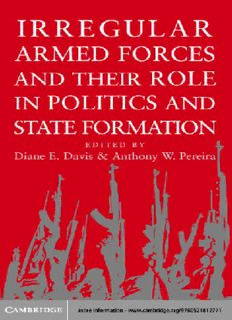
Irregular Armed Forces and their Role in Politics and State Formation PDF
Preview Irregular Armed Forces and their Role in Politics and State Formation
This page intentionally left blank Irregular Armed Forces and Their Role in Politics and State Formation Existing models of state formation are derived primarily from early Western European experience and are misleading when applied to those nation-states struggling to consolidate their dominion in the present period. They also oversimplify aspects of the Western European experience itself. In this volume, scholars of politics and state formation focusing on a variety of countries and time periods suggest that the early Western European model of armies’ waging war on behalf of sov- ereign states does not hold universally. In particular, the importance of “irregular” armed forces – militias, guerrillas, paramilitaries, merce- naries, bandits, vigilantes, police, and so on – has been seriously neglected in the literature on this subject. The case studies in this book suggest, among other things, that the creation of the nation-state as a secure political entity rests as much on “irregular” as regular armed forces. In many parts of the world, the state’s legitimacy has been extraordinarily difficult to achieve, constantly eroding or under challenge by irregular armed forces within a country’s borders. No account of modern state formation can be considered complete without attending to these irregular forces. Professor Diane E. Davis is Associate Professor of Political Sociology at the Massachusetts Institute of Technology. She has been the recipi- ent of major fellowships from groups such as the Mellon Foundation, the Ford Foundation, and the MacArthur Foundation, and she has edited the research annual Political Power and Social Theory for ten years. She is the author of Urban Leviathan: Mexico City in the Twentieth Century (1994). Professor Anthony W. Pereira is Associate Professor in the Department of Political Science at Tulane University. His research interests include social movements, state formation, and judicial politics in Latin America. He is the author of The End of the Peasantry: The Emergence of the Rural Labor Movement in Northeast Brazil, 1961–1988(1997). Irregular Armed Forces and Their Role in Politics and State Formation Edited by DIANE E. DAVIS Massachusetts Institute of Technology ANTHONY W. PEREIRA Tulane University Cambridge, New York, Melbourne, Madrid, Cape Town, Singapore, São Paulo Cambridge University Press The Edinburgh Building, Cambridge , United Kingdom Published in the United States of America by Cambridge University Press, New York www.cambridge.org Information on this title: www.cambridge.org/9780521812771 © Cambridge University Press 2003 This book is in copyright. Subject to statutory exception and to the provision of relevant collective licensing agreements, no reproduction of any part may take place without the written permission of Cambridge University Press. First published in print format 2003 - isbn-13 978-0-511-07311-3 eBook (EBL) - isbn-10 0-511-07311-9 eBook (EBL) - isbn-13 978-0-521-81277-1 hardback - isbn-10 0-521-81277-1 hardback Cambridge University Press has no responsibility for the persistence or accuracy of s for external or third-party internet websites referred to in this book, and does not guarantee that any content on such websites is, or will remain, accurate or appropriate. Contents Contributors page vii introduction 1 Contemporary Challenges and Historical Reflections on the Study of Militaries, States, and Politics 3 Diane E. Davis part i. the basic framework and beyond: mobilization, demobilization, and national state formation 2 Armed Force, Regimes, and Contention in Europe since 1650 37 Charles Tilly 3 Limited War and Limited States 82 Miguel Angel Centeno 4 Where Do All the Soldiers Go? Veterans and the Politics of Demobilization 96 Alec Campbell 5 Military Mobilization and the Transformation of Property Relationships: Wars That Defined the Japanese Style of Capitalism 118 Eiko Ikegami part ii. deconstructing armed forces: from militaries to militias, paramilitaries, police, and veterans 6 Send a Thief to Catch a Thief: State-Building and the Employment of Irregular Military Formations in Mid-Nineteenth-Century Greece 149 Achilles Batalas v vi Contents 7 Reform and Reaction: Paramilitary Groups in Contemporary Colombia 178 Mauricio Romero 8 Policing the People, Building the State: The Police-Military Nexus in Argentina, 1880–1945 209 Laura Kalmanowiecki 9 War-Making and U.S. State Formation: Mobilization, Demobilization, and the Inherent Ambiguities of Federalism 232 Susan M. Browne 10 Politics Is Thicker Than Blood: Union and Confederate Veterans in the U.S. House of Representatives in the Late Nineteenth Century 253 Richard Franklin Bensel part iii. not just the nation-state: examining the local, regional, and international nexus of armed force and state formation 11 The Police Municipale and the Formation of the French State 281 Lizabeth Zack 12 Domestic Militarization in a Transnational Perspective: Patriotic and Militaristic Youth Mobilization in France and Indochina, 1940–1945 303 Anne Raffin 13 The Changing Nature of Warfare and the Absence of State-Building in West Africa 322 William Reno 14 The Ghost of Vietnam: America Confronts the New World Disorder 346 Ian Roxborough conclusion 15 Armed Forces, Coercive Monopolies, and Changing Patterns of State Formation and Violence 387 Anthony W. Pereira Index 409 Contributors Achilles Batalas New School for Social Research Richard Franklin Bensel Cornell University Susan M. Browne New School for Social Research Alec Campbell Colby College Miguel Angel Centeno Princeton University Diane E. Davis Massachusetts Institute of Technology Eiko Ikegami New School for Social Research Laura Kalmanowiecki Rowan University Anthony W. Pereira Tulane University Anne Raffin National University of Singapore William Reno Northwestern University Mauricio Romero Universidad Nacional de Colombia vii viii Contributors Ian Roxborough State University of New York at Stony Brook Charles Tilly Columbia University Lizabeth Zack Rhodes College
Description: